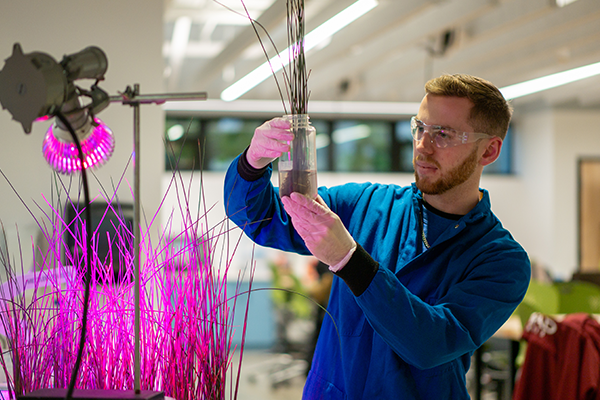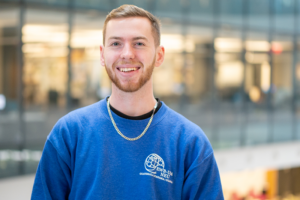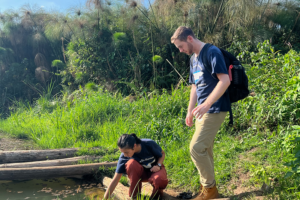Creating Change With Environmental Engineering and Community Engagement

Main photo by Bella Martinez, Northeastern University.
Ben Lanava, E’24, environmental engineering, has had a research assistant role, two co-ops, two Dialogues of Civilization, and an Engineers Without Borders trip to Uganda, leading to many award nominations such as the Rhodes Scholarship.
Ben Lanava, E’24, is in the final stretch of his undergraduate experience as an environmental engineering major and in his wake is a string of accomplishments that not only places him on the cusp of a successful career but has impacted many lives.
“At Northeastern, there was so much room for me to grow and take on all these different roles,” Lanava says “I’m not sure if I would have had that opportunity at other colleges.”
So far, his accomplishments have included working for nearly four years as a research assistant to Annalisa Onnis-Hayden, teaching professor of civil and environmental engineering, completing two co-ops, taking three trips abroad, including two Dialogue of Civilizations programs and one service trip, holding executive leadership positions for engineering student groups, and volunteering with Boston-area children.

Ben Lanava, E’24, environmental engineering. Photo by Bella Martinez, Northeastern University
As testimony to his hard work, Lanava received a PEAK Experiences Award for his research on plant-based solutions to remove highly toxic “forever chemicals” from water supplies. The PEAK Experiences Awards are categorized in a progressively structured sequence to acknowledge heights of achievement. Lanava received a top-level, or Summit, award.
He a received a Udall Undergraduate Scholarship Honorable Mention, and was nominated for a Rhodes, Marshall, and Knight-Hennessey Scholarship. He was also named to the Huntington 100, a university-wide annual honor to recognize students who embody the mission, ideals, and values of Northeastern.
But what matters most to Lanava is getting clean water to people, especially those with the least access to it. His research is two-fold. The first explores how to remove dangerous chemicals from the water and the second is to build water delivery systems. He is particularly interested in community engagement and believes working with community members as partners makes any project more successful.
“To me, success is the intersection between engineering and community engagement and making sure voices are heard from the community,” Lanava says.
Beginning in his first year, Lanava conducted research on improving water quality by eliminating toxic chemicals known as perfluoroalkyl and polyfluoroalkyl substances, or PFAS. Current solutions can be expensive because they involve other chemicals to counteract PFAS and can require the removal of the chemicals from the water and disposing of them elsewhere. Lanava’s research departs from this strategy by introducing fungi into water that can degrade and destroy the PFAS. This approach would be significantly less expensive because it involves no additional chemicals or chemical removal.

Lanava and teammate examine a stream in Uganda while on an Engineers Without Borders trip.
A second research effort has focused on the design and implementation of water delivery systems. Lanava joined Northeastern’s student chapter of Engineers Without Borders in his first year and now serves as president. He co-led a small group on a trip to Uganda in late August 2023 to support two villages with a combined population of about 4,000. During the nearly two-week stay, the group set up a solar powered pump, solar panels, a tank, and a tap stand.
“Hopefully the next phase will be with students coming after me,” Lanava says. “They will get to design and figure out the best places for the distribution system, which is really exciting because they get to have that community work with them.”
Earlier in 2023, Lanava travelled to Sardinia, an island off the coast of Italy, as part of a Dialogue of Civilizations program with Onnis-Hayden, who grew up on the island. The group researched recycling and how to create new products from trash or convert it to energy.
Lanava also completed a Dialogue of Civilizations program in the Netherlands with Peter Furth, professor of civil and environmental engineering and a leading expert in sustainability in transportation. The experience reinforced his belief in the importance of community engagement as the group examined successful cycling and pedestrian traffic projects.
During his time at Northeastern, Lanava completed two co-ops, the first of which was at Dewberry, an engineering, construction, and consulting firm in Boston. He worked with mapping software that provided data on issues like broken pipes that impacted environmental projects.
Lanava says the co-op was “really cool,” and helped him determine that he wanted to pursue a more hands-on job. His second co-op, also in Boston, was at Allonnia, a biotechnology and engineering company. He assisted on lab work to develop mechanisms that can detect PFAS in water supplies. In fact, the experience inspired Lanava to pursue the plant-based research he continues to work on today.
While Lanava’s time at Northeastern has opened up so many opportunities, some of what motivates him goes back to his childhood. “I kept hearing news stories and it just always sounded like bad news,” he says. “It made sense to work towards solving some of these problems. There has to be some kind of hope.”